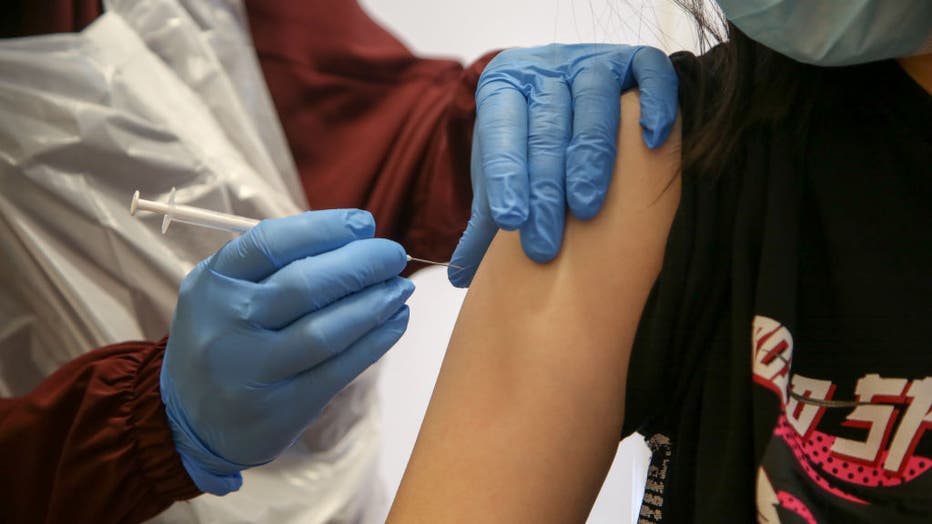COVID-19 booster: CDC panel votes in favor on 3rd shot for immunocompromised after FDA approval
WASHINGTON - A U.S. Centers for Disease Control and Prevention advisory group on Friday voted to recommend administering COVID-19 booster shots to people with weakened immune systems following approval by the U.S. Food and Drug Administration.
The CDC’s Advisory Committee on Immunization Practices voted 11-0 in favor of administering an extra dose of the Pfizer or Moderna COVID-19 vaccines for those who are immunocompromised, such as organ transplant recipients, cancer or HIV patients, or people with other conditions.
The high-risk group is estimated to be no more than 3% of U.S. adults.
Late Thursday, the FDA announced its authorization of the additional COVID-19 booster vaccine for those with severely weakened immune systems as the highly contagious delta variant continues to fuel a resurgence of U.S. infections.
The CDC advisory committee then convened to discuss the data and issue its own recommendation of the extra shots for certain immune-compromised groups. The CDC is expected to accept the advisory group’s recommendation, giving its own endorsement and prompting the administration of booster shots in the U.S.
The CDC has previously identified immunocompromised people as being at higher risk for getting severely ill from COVID-19, more likely leading to hospitalization or death. Among them are people with HIV or AIDS, transplant recipients, some cancer patients and people with autoimmune disorders such as rheumatoid arthritis, inflammatory bowel disease and lupus, the CDC explains on its website.
It’s harder for vaccines to rev up an immune system suppressed by certain medications and diseases, so those patients don’t always get the same protection as otherwise healthy people — and small studies suggest for at least some, an extra dose may be the solution.

FILE - A health worker administers the Pfizer COVID-19 vaccine to a woman at a vaccination center on Aug. 12, 2021, in London, England. (Photo by Dinendra Haria/SOPA Images/LightRocket via Getty Images)
The FDA determined that patients with a high level of compromised immunity can receive a third dose of the vaccines from Pfizer and Moderna at least 28 days after getting their second shot. The FDA made no mention of immune-compromised patients who received the single-dose Johnson & Johnson vaccine.
For now, the new policy allows a third dose of the Pfizer vaccine for children as young as 12 who also meet the high-risk requirement, but adults only for a third Moderna dose. The CDC panel said the additional dose should match the vaccine given during the initial series, but if it’s not feasible, another mRNA dose is permitted.
The CDC cited one study suggesting about 40% to 44% of people hospitalized for a so-called breakthrough case — infection after vaccination — are among the immune-compromised. Those hospitalized patients "did all the right things -- they’re just suffering from a lack of good vaccine protection," said Dr. Camille Kotton of Massachusetts General Hospital, one of CDC’s advisers.
Concern for such patients has increased as the delta variant has surged through much of the country, pushing new cases, hospitalizations and deaths to heights not seen since last winter.
Importantly, the FDA’s decision only applies to this high-risk group. Fully vaccinated people who do not have weakened immune systems do not need booster shots "at this moment," Dr. Anthony Fauci said Thursday — an assertion echoed by the CDC. Data is currently being collected for other vaccinated groups, such as the elderly, to determine if or when their protection falls below a critical level.
RELATED: Overwhelmed hospitals face nurse shortages amid US COVID-19 surge
Emerging evidence has indicated people with weakened immune systems could benefit from a booster dose of vaccine in order to bump up their antibody response against the virus. Most recently, a study published Wednesday in the New England Journal of Medicine reported that a third dose of Moderna's COVID-19 vaccine substantially improved protection for organ transplant recipients.
RELATED: Study finds COVID-19 booster dose helps protect transplant patients
U.S. health officials have long said that people one day might need a booster, as they do for many other vaccines. That’s why studies are underway to test different approaches: simple third doses, mix-and-match tests using a different brand for a third dose, or experimental boosters tweaked to better match different variants.
Fauci added on Thursday during an interview with NBC’s "Today" that most people will "inevitably" need a booster dose in the future.
"No vaccine, at least not within this category, is going to have an indefinite amount of protection," Fauci said.
Meanwhile, Israel has already started giving boosters to older adults. Several other countries, including Germany, Russia and the U.K., have approved them for some people.
"This is all going to be very personalized," cautioned Dr. Dorry Segev, a transplant surgeon at Johns Hopkins University who is running a major National Institutes of Health study of extra shots for organ recipients. For some people, a third dose "increases their immune response. Yet for some people, it does not seem to. We don’t quite know who’s who yet."
RELATED: COVID-19 boosters: Some in US getting extra shot without FDA approval
This story was reported from Cincinnati. The Associated Press contributed.

